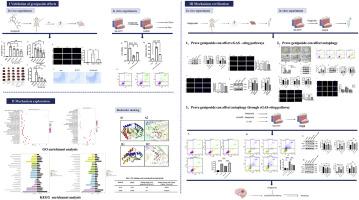京尼平苷通过cGAS-STING抑制自噬对脑缺血再灌注诱导的神经元损伤的影响。
IF 4.6
2区 医学
Q1 NEUROSCIENCES
引用次数: 0
摘要
研究目的:本研究旨在探讨京尼平苷(genposide, GEN)通过靶向cGAS-STING通路,调节神经元细胞自噬,对脑缺血再灌注损伤的保护作用。材料与方法:模拟人缺血性脑卒中病理的体内大脑中动脉闭塞/再灌注(MCAO/R)模型和体外氧糖剥夺/再灌注(OGD/R)模型。行为测试,组织染色评估小鼠的神经缺损和组织损伤。RNA-Seq分析、分子对接、免疫荧光、western blotting和透射电镜验证潜在的自噬分子机制。结果:GEN可显著减少MCAO/R小鼠脑梗死体积和神经元凋亡。在OGD/R模型中,GEN可提高细胞活力,降低细胞凋亡率。在机制上,GEN抑制cGAS-STING通路的激活,抑制缺血再灌注损伤过程中观察到的过度自噬。RNA-Seq分析和分子对接支持这些发现,表明自噬和cGAS-STING通路参与了gen介导的神经保护。结论:GEN对脑缺血再灌注损伤具有明显的神经保护作用,可减轻神经元凋亡,改善神经功能。这些作用归因于它们通过抑制cGAS-STING途径调节自噬的能力。这些发现突出了GEN作为缺血性卒中治疗的一种有希望的治疗候选药物。本文章由计算机程序翻译,如有差异,请以英文原文为准。

Effects of geniposide on cerebral ischemia/reperfusion-induced neuron damage by inhibiting autophagy via cGAS-STING
Aim of the study
This study aimed to investigate the protective effects of Geniposide (GEN) against cerebral ischemia-reperfusion injury by targeting the cGAS-STING pathway and modulating autophagy in neuronal cells.
Materials and methods
In vivo middle cerebral artery occlusion/reperfusion (MCAO/R) model and an in vitro oxygen-glucose deprivation/reperfusion (OGD/R) model to mimic the pathology of cerebral ischemic stroke in humans. Behavioral tests, tissue staining to assess neurological deficits and tissue damage in mice. RNA-Seq analysis, molecular docking, immunofluorescence, western blotting, and transmission electron microscopy to verify the underlying autophagic molecular mechanisms.
Results
GEN significantly reduced cerebral infarction volume and neuronal apoptosis in MCAO/R mice. In OGD/R models, GEN improved cell viability and reduced apoptosis rates. Mechanistically, GEN inhibited cGAS-STING pathway activation, suppressing excessive autophagy observed during ischemia-reperfusion injury. RNA-Seq analysis and molecular docking supported these findings, indicating the involvement of autophagy and the cGAS-STING pathway in GEN-mediated neuroprotection.
Conclusion
GEN demonstrates potent neuroprotective effects against cerebral ischemia-reperfusion injury by mitigating neuronal apoptosis and improving neurological functions. These effects are attributed to their ability to modulate autophagy by inhibiting the cGAS-STING pathway. These findings highlight GEN as a promising therapeutic candidate for ischemic stroke treatment.
求助全文
通过发布文献求助,成功后即可免费获取论文全文。
去求助
来源期刊

Neuropharmacology
医学-神经科学
CiteScore
10.00
自引率
4.30%
发文量
288
审稿时长
45 days
期刊介绍:
Neuropharmacology publishes high quality, original research and review articles within the discipline of neuroscience, especially articles with a neuropharmacological component. However, papers within any area of neuroscience will be considered. The journal does not usually accept clinical research, although preclinical neuropharmacological studies in humans may be considered. The journal only considers submissions in which the chemical structures and compositions of experimental agents are readily available in the literature or disclosed by the authors in the submitted manuscript. Only in exceptional circumstances will natural products be considered, and then only if the preparation is well defined by scientific means. Neuropharmacology publishes articles of any length (original research and reviews).
 求助内容:
求助内容: 应助结果提醒方式:
应助结果提醒方式:


